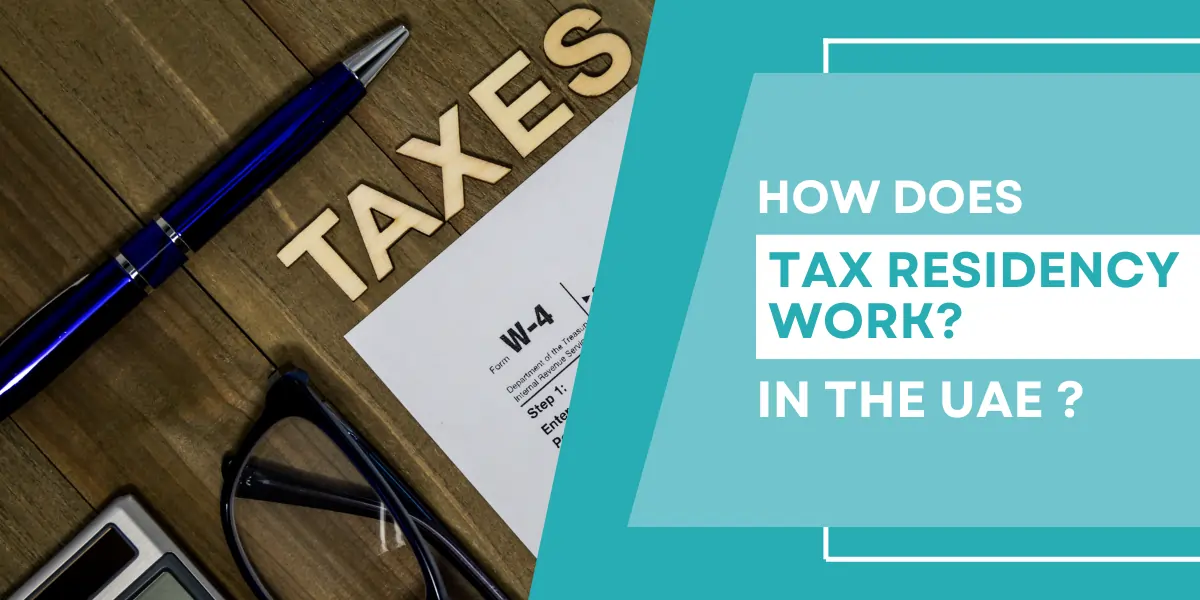
How Does Tax Residency Work In UAE?
Because of the UAE’s favorable tax environment and business-friendly atmosphere, many people find the idea of tax residence there appealing. For people or legal entities, navigating the complexities of becoming a tax resident can be challenging. With new rules and standards, it is more important than ever to understand the tax residence situation in the United Arab Emirates. We’re here to walk you through the complexities of obtaining and preserving tax residence in the United Arab Emirates, including qualifying standards, application procedures, and related advantages. It offers a thorough manual for foreigners living abroad, investors, and companies wishing to take advantage of the UAE’s advantageous tax structure while upholding international norms and reaping the rewards of double taxation agreements.
Tax Residency In The UAE
An Overview of the Tax System in the United Arab Emirates
The federation of seven Emirates known as the United Arab Emirates (UAE) is praised for its open trade policies, state-of-the-art infrastructure, and stable political environment. The country’s reliance on the energy sector has decreased as it has expanded its economic frontiers. The absence of personal income tax on work or other personal income is a notable aspect of the tax system in the United Arab Emirates. The tax environment in the UAE is very appealing to investors and expatriates, which enhances the country’s reputation as a business-friendly destination.
The UAE’s Definition of Tax Residence
Specific standards outlined in UAE Cabinet of Ministers Decision No. 85 of 2022, which became operative on March 1, 2023, determine tax residency in the United Arab Emirates. According to this ruling, if your principal place of residence is in the UAE and it serves as your center of financial and personal interests, you are deemed a tax resident of the UAE. Additionally, you can establish your tax residency through physical presence; to do this, you must spend at least 183 days in the United Arab Emirates over the course of a calendar year.
Alternatively, you may also be considered a tax resident if you live or conduct business in the United Arab Emirates for at least ninety days during the course of a year, and you either have a UAE residence permit, are a national of the United Arab Emirates, or are a national of a member state of the Gulf Cooperation Council (GCC) and have a permanent residence in the UAE. The implementation of these requirements does not imply that personal income tax is immediately due. Rather, it provides clarification to individuals seeking to ascertain their tax residency status, particularly with respect to bilateral tax agreements.
The revised concept of tax residency will facilitate the application of the multiple Double Tax Treaties (DTTs) that the UAE has signed and the issuance of tax residency certificates.
Comparing Citizenship and Tax Residency
Making the difference between citizenship and tax residency is crucial. A state grants its citizens citizenship, however your tax residency is determined by your economic ties to a nation. Tax residency in the UAE is essential for submitting DTT applications; it is not a requirement for citizenship.
The new tax residence regulations seek to provide people and legal entities with clarity regarding their tax circumstances while also aligning with worldwide standards. Legal entities’ determination of tax residency is based on their establishment, recognition under UAE law, or efficient management and control within the UAE. The latest Cabinet Decision makes it clear that branches of foreign legal companies are not regarded as UAE tax residents.
The distinction between citizenship and tax residence is also evident in the way foreign companies operating in the UAE are handled. These people might be considered “Resident Persons” under the UAE Corporate Tax Law for the purposes of taxing business revenue; this is distinct from their status as tax residents for other tax-related purposes.
How To Establish Tax Residency in the UAE
Who is qualified to obtain a UAE tax residence certificate?
A TRC can be obtained by both legal persons and individuals in order to utilize the UAE’s DTAA network. Individuals must remain in the country for a minimum of 183 days within the relevant fiscal year. This covers foreign nationals from the GCC who work or have a permanent residence in the UAE, as well as expats with a valid residency permit.
For a legal entity to be qualified for a TRC, they must have been incorporated in the UAE for a minimum of one year. Foreign company branches and offshore businesses are not included, though. In addition, in order to receive certificates pertaining to commercial activity, companies need to be registered for VAT.
How to Apply for a Tax Residency Certificate
To apply for a TRC, candidates must use the FTA-managed EmaraTax portal. It takes roughly 45 minutes to complete the procedure, which includes creating a new account or checking in with your current credentials. After receiving a completed application, the FTA normally processes them in five working days. With the exception of government enterprises, the TRC is awarded for a single fiscal year starting at the start of the proposed fiscal year and is not renewable.
Required Documents for the Application for Tax Residency
Depending on whether the applicant is a person or a legal business, different documents are needed for the TRC application. A certified copy of their residential leasing agreement, an income or salary certificate, a passport, a residence permit, and an Emirates ID are required. In addition, entry and exit reports, proof of a permanent residence, a six-month bank statement from a local bank, and information about the source of income are required.
Legal entities must provide a certified copy of their audited financial accounts, a certified leasing agreement or tenancy contract, proof of authorization, and their trade license. Additional requirements include, if applicable, a certified copy of the Memorandum of Association and a six-month bank statement from a local bank.
Benefits of UAE Tax Residency
The United Arab Emirates does not impose wealth or dividend taxes on people, nor does it have a personal income tax. One big benefit for investors and business owners is that there is no capital gains tax on personal investments.
The favorable tax environment, which includes no corporate tax on profits and no withholding tax on outgoing payments, is advantageous to businesses as well. Note that most goods and services are subject to a 5% VAT, with some commodities having higher levies.
For the benefit of people with foreign financial interests, the UAE’s network of DTTs helps avoid double taxation on income received from member nations. To take advantage of the advantages of DTTs, people and companies must possess the tax residence certificate issued by the Ministry of Finance. The ability to claim tax exemptions in their countries of permanent residence is granted to tax residents by this certificate, which is recognized by UAE authorities and needs to be updated annually.
The UAE does not participate in the CRS, demonstrating its dedication to financial privacy. The financial information of tax residents is kept more secret thanks to this strategy. The nation’s banking industry provides extensive services and credit options, which enhances its standing as a major international financial hub. The UAE’s appeal as a desirable place for tax residency is further cemented by the country’s favorable business environment and political stability.
Maintaining and Renewing Tax Residency
The Tax Domicile Certificate, or TRC for short, is an important document. It verifies your tax status and enables you to benefit from agreements to avoid double taxation. Since these certificates only last for a year, it’s important to keep track of when they expire in order to keep your tax resident status.
People must have been residents of the United Arab Emirates for a minimum of six months and possess a valid residency permit that has been in effect for at least 180 days prior to applying for a TRC. Companies must have been operating for at least a year on the UAE mainland or in any free zone in order to qualify. Offshore businesses can apply for a tax exemption certificate (TECC) but are not eligible for a TRC.
Every year, you have to renew your TRC. The process starts with pre-approval and usually takes 4-5 business days with the FTA. The certificate is typically issued within five business days of your application being accepted and the payments being paid.
The definitions of individual tax residency have recently been clarified by Ministerial Decision No. 27 of 2023, bringing them into compliance with international standards. This ruling establishes the rules for tax residency as of March 1, 2023, which include having a principal residence in the United Arab Emirates and fulfilling physical presence standards.
The UAE’s requirements for tax residency are strongly related to your presence and actions there. If a business is recognized or incorporated in the United Arab Emirates, or if it satisfies other legal requirements, it is considered a tax resident.
The TRC application process for people and businesses include submitting a form to the FTA site along with the required paperwork. While the necessary paperwork differs for businesses and people, it often consists of identity papers, bank statements, financial statements, and lease agreements. Upon approval of your application, the TRC is provided. When requesting withholding tax limitations or exclusions under DTTs, this document is essential for granting tax benefits or refunds in foreign nations where you may also be regarded as a tax resident.
Obtain Tax Residency in the UAE
It is highly recommended for both individuals and organizations seeking to capitalize on a business-friendly climate to navigate the UAE tax residency landscape. The United Arab Emirates (UAE) is a shining example for global commercial interests due to its clear tax residency standards, real benefits such as financial privacy and tax exemptions.
If you’re thinking about using the UAE as a tax haven, make sure to carefully maintain your resident status and stay up to date on any changes to the law.
The work required to get and maintain your Tax Residency Certificate is a minor cost given the benefits and economic freedoms offered by this thriving nation. The UAE tax residency framework is your ticket to success in a world of financial opportunities, regardless of whether you are an international business entity with global aspirations or a touring entrepreneur.
